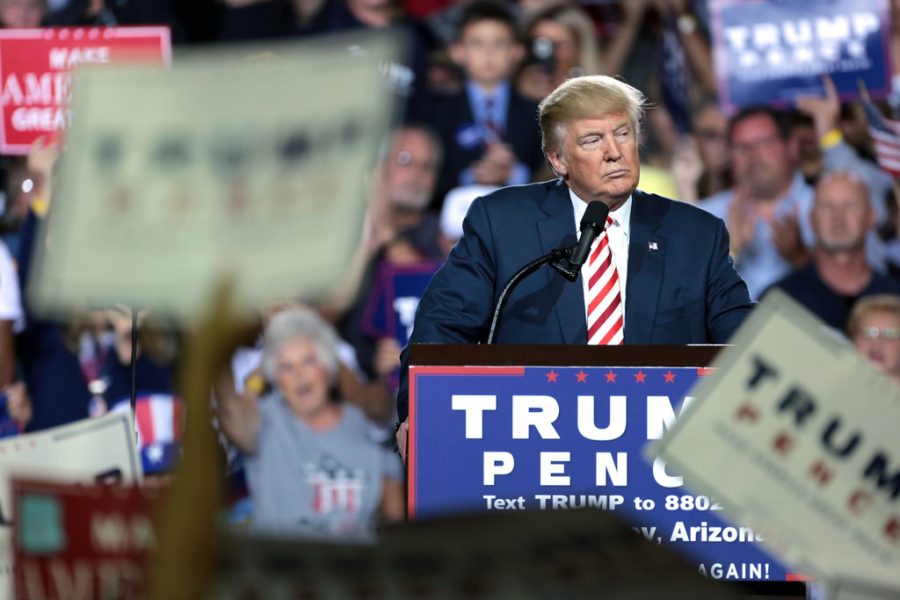Trump won, but his hate won’t
Donald Trump, our 45th President of the United States has incited bullying, violence, and riots throughout the country.
After a painfully long election year, which began with all of ten Republicans and five Democrats debating on a national stage, a winner has finally been declared. Donald Trump, a man with no previous political experience, a man who has been accused of molestation, a man who has threatened to force an entire religious group to wear badges, will be our nation’s 45th president.*
Donald Trump, from the start, was not the average candidate; he was unlike anything our nation had ever seen. Rather than being sophisticated and poised, he was an outspoken wildcard, one who most agreed to dislike from the start. But as this election year drew to a close, the other candidates were eliminated and we were left with only two: Donald Trump (R) and Hillary Clinton (D).
While agreeing that Clinton had her fair share of controversy and corruption, she was a candidate that called for inclusivity rather than hate, which many Democrats could get behind. Clinton, though experienced as a politician, was not the change the people of the United States wanted.
She was the same as any other politician, corrupt and undeserving of our party and our country’s trust. But she did have a redeeming quality in the eyes of the Democratic Party — she wasn’t Donald Trump.
Trump, unlike Clinton, had a platform based on hate and his ability to run a successful business (or approximately 500 of them).
Trump is not your average conservative. He is a fearmonger who has made nothing but empty promises and spread nothing but hate and violence at the end of an inclusive Obama-era.
A Donald Trump presidency does not represent a boost in our economy, it represents fear for many groups in the United States. Those groups consist of LGBT+ people, women, muslims, the disabled, immigrants, Hispanics, Asians, and hundreds of others.
When you choose a president, you aren’t just choosing someone who understands economics, you are picking a human being. A human being that will represent your country to other countries and within your own country. A vote for Donald Trump, even for economic reasons, shows an immense disrespect for the people he has so publicly disrespected throughout his career in the public and his political campaign.
Money is not more important than the millions of people whose lives will be changed by the irreparable damage that Trump will undoubtedly do to our country.
The root of this issue for most Americans is what’s now been dubbed as ‘locker room talk’ in which Trump was caught on tape making light of and condoning sexual assault by saying “when you’re a star they let you do it. You can do anything … Grab them by the _____.”
As expected, this sent many of his supporters rushing to distance themselves from Trump, but what many don’t grasp is that this wasn’t the first instance Trump has made lewd or discriminatory comments about women.
He has been known to often reduce a woman to just appearance, sometimes even rating them on a scale of one to ten and commenting on their physique. He also holds the backwards view that reduces women to only being valuable for sex and household chores.
Getting the first female nominee from a major political party was a huge step forward in the field of women’s rights. But electing a known misogynist as President is an even bigger leap back.
But what Trump voters wanted was a president who wasn’t Obama, and a president who they thought could unite the American people rather than increase the current polarity in Congress and in America. The people wanted someone who could work across party lines, and those in support of Trump argue that since Trump was once a liberal, he is the candidate that will unify the divisive state of U.S. politics.
It’s quite the opposite. Trump has alienated minority groups in this country so much so that even members of his own party have distanced themselves from Donald Trump. Take John Kasich for example, Kasich was Trump’s opponent in the Republican primaries and throughout the election he has been a strong anti-Trump presence in the Republican party, and unlike Trump’s other opponents in the primaries, refused to endorse Trump’s campaign for presidency.
If Trump is causing this sort of polarity in his own political party, there’s little to no chance of him unifying with the many minority groups he’s bullied throughout the election; in fact it represents an even greater dichotomy in this country and this election which is hate versus fear.
Even the hate that Donald Trump has inspired in the American people is polarizing. But it isn’t unfamiliar for the American people to hate a presidential candidate, but it is unfamiliar, at least in the 21st century, for a presidential candidate’s rhetoric to promote hatred against certain groups of people.
We’ve seen this in Trump’s immigration policy which can easily be restated in three words: Build the Wall. Trump even headed off his campaign last year saying that illegal Mexican immigrants were not “[Mexico’s] best”, categorizing most Mexicans who illegally come into the country as “drug dealers” and “rapists”.
Trump’s immigration policy was made even more clear as the election progressed; he was in support of a wall between Mexico and America, a wall that he assured us Mexico would pay for, and was in support of mass deportations of undocumented immigrants.
And of course there was his position on Syrian refugees. Trump proposed that the U.S. ban Muslims from entering the country, and was in support of surveillance in mosques and a database that kept track of all Muslims living in the United States. Trump claimed this was because “There is great hatred towards Americans by large segments of the Muslim population.”
These claims only validated Islamophobia and left a majority of the 3.3 million Muslims feeling unsafe, worried, and victimized. The problem with singling out one entire race or religion is the message it sends to Americans and leaders all over the world. The U.S. now appears unwelcoming, exclusive, and becomes an even bigger target.
In July, Trump lashed out at two Muslim American parents whose son fought for his life in the U.S. military in Iraq. Khizer Khan, father of Capt. Humayun Khan, spoke at the DNC in support of Clinton with his wife by his side. The next day, Trump criticized the Khan’s by saying “His wife, if you look at his wife, she was standing there. She had nothing to say. She probably, maybe she wasn’t allowed to have anything to say.” Instead of understanding that the parents were speaking about a sensitive, personal subject that made them emotional, Trump attacked their religion.
Trump’s immigration reform also states open jobs will be offered to American workers first, despite the fact that there may be a candidate out there who is more qualified and educated. As a businessman, you would hope Trump would value hard work and dedication, but instead is more focused on their state of citizenship.
This kind of talk is the reason hundreds of students across the nation have approached minority students saying that, since Trump was elected, his or her family will be deported.
A country where Donald Trump can be our 45th president despite the hundreds of terrible things he’s said, while being recorded, is a country where bullies rule, which trickles down into our communities, schools, and workplaces.
Trump, despite the hate and polarization he has caused in our country, is our nation’s 45th president. Trump, as our nation’s president, has realized that he has a job to unify all people of the United States of America. It is up to him to comfort the American people, to apologize for his campaign’s rhetoric, and to make sure he is the president of the people — of all people.
We cannot, as Americans, allow this election to define us, not in foreign affairs, in our own politics, and most definitely not in our communities. We will continue to wear safety pins in solidarity with those Trump has offended, we will continue to be Americans, and we will not give up on the country that has given us gay marriage rights, a black president, and a female presidential candidate.
We have come too far to let hate win. We have come too far to let Trump ruin a country that is, and always was, great.
*This Editorial is the consensus of this publication’s Editors-in-Chief.














